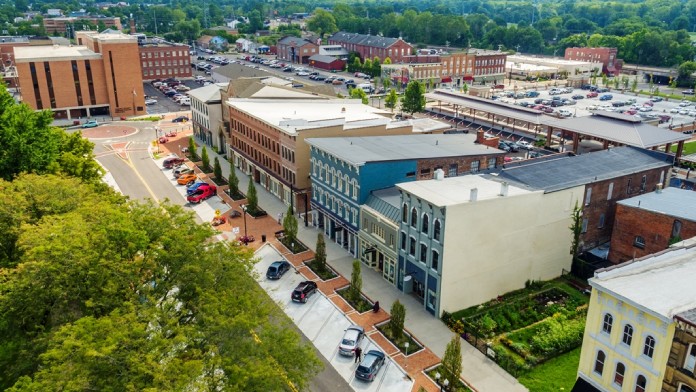Alcohol and Drug Use Statistics in Newark, OH
The Licking County Health Department released an overdose fatality review covering data from 2020. Here’s a breakdown of those statistics along with alcohol misuse numbers for the county:1,3
In 2020, 66% of overdose fatalities were men and 34% were women. Almost 90% of fatalities were identified as White.
27.7% of all overdose fatalities were among residents between 25 and 34 years old, which was the most common age group.
In 2019, 19% of adults in the county reported binge or heavy drinking.
Levels of Addiction Treatment
Here are the various levels of addiction treatment you’ll want to consider.
Professional Detox
Suddenly quitting drugs and alcohol often results in painful and even dangerous withdrawal symptoms. Professional detox can help manage these symptoms and keep you safe and comfortable while you go through withdrawal.
Residential Alcohol and Drug Rehab
The most structured and intensive setting, you live at the facility for a month to several months, depending on your needs. This option may be beneficial for those with a severe addiction or those who have previously dropped out of outpatient treatment.
Partial Hospitalization Programs (PHPs)
A step down from residential, PHPs involve a high frequency of care that is similar to inpatient except you return home during non-treatment hours.
Intensive Outpatient Programs (IOPs)
A step down from a PHP, IOPs involve several hours of treatment per day, for three to five days per week.
Standard Outpatient
The least intensive option, standard outpatient, involves just a few hours of treatment per week. It may only be appropriate for someone with a mild addiction, strong support system, and strong motivation to quit.
Aftercare
When you near the end of your program, you’ll collaborate with your treatment team on creating an aftercare plan that will help you stay sober even when transitioning back into your everyday life.
How to Pay for Drug and Alcohol Rehab in Ohio
There are many ways to finance the cost of drug rehab in order to get the help you need.
Private Insurance
Thanks to the Mental Health Parity and Addiction Equity Act, every insurance provider must cover substance abuse treatment to some extent. Contact your health insurance provider directly to learn more about your specific plan and its coverage.
Ohio Medicaid
Ohio Medicaid, a government program for low-income people, covers some or all of drug addiction treatment, including inpatient, outpatient, PHPs, and beyond.
Medicare
Ohio Medicare, a government program providing coverage to people 65 and older, covers alcohol and drug rehab as well as screening and assessments.
TRICARE in Ohio
Ohio TRICARE, a government program providing coverage for veterans and military personnel, covers some or all of the cost of substance abuse treatment services.
Sliding Scale Payments
Sliding scale rehabs are a great option for those looking to reduce the financial burden of rehab. They offer discounted drug rehab based on a person’s income and financial situation.
IHS-Funded Drug Rehabs
These rehabs receive funding from the Indian Health Service and in turn are able to provide no-cost addiction treatment to Native peoples.

Traveling to and Within Newark, OH
If you are exploring the idea of a Newark alcohol or drug rehab or are looking to come into town to visit a loved one who is in treatment, here are some helpful tips about how to best get around town and what to do once you’re there:
- Public transportation is available in Newark through Licking County Transit. The GoBus’ Columbus-Wooster route can also get you to Newark.
- The nearest major airport is the Port Columbus International Airport in Columbus. It’s about 36 miles from Newark.
- Downtown Newark is designed to be pedestrian-friendly and features restaurants, landmarks, and unique shops. There is also plenty of parking if you will have a car.
- Newark maintains more than 20 parks and 11 miles of bike trails. Nature enthusiasts can enjoy fishing, mountain biking, hiking trails, swimming, and ice skating, just to name a few activities.
- The town’s Outdoor Fitness Park is accessible to everyone, including those with mobility issues.
- More than 2,000 years ago, the Hopewell culture built the Newark Earthworks, a series of earthen mounds and enclosures. The earthworks cover about 206 acres and are a designated National Historic Landmark.
- There are several hotel options in Newark and nearby Heath.
Ohio Substance Misuse and Overdose Laws
Here are some relevant and important Ohio drug and alcohol laws:1
Ohio Addiction Discrimination Laws: Employees are able to request time off work to attend addiction treatment and employers are required to provide reasonable accommodation to them, as long as the employee’s absence won’t cause hardship for the company.
Ohio Naloxone Access Law: Anyone can purchase naloxone at a pharmacy without a prescription.
Ohio Good Samaritan Overdose Law: Much like other states, this law provides protection from drug-related prosecution for those who call 911 when someone is overdosing. Unlike other states, the person must seek screening and referral for addiction treatment within 30 days of calling 911. They also won’t get immunity if they’ve already sought immunity twice under this law.
Resources
- Licking County Health Department. (2021). Overdose Fatality Review Annual Report 2020.
- Licking County Health Department. (2022). Community Advisory – Drug Overdose Spike in Licking County.
- University of Wisconsin Population Health Institute. (2022). County Health Rankings – Licking.


